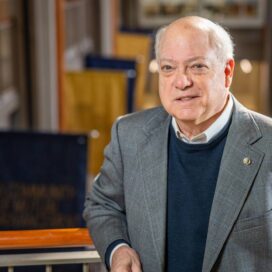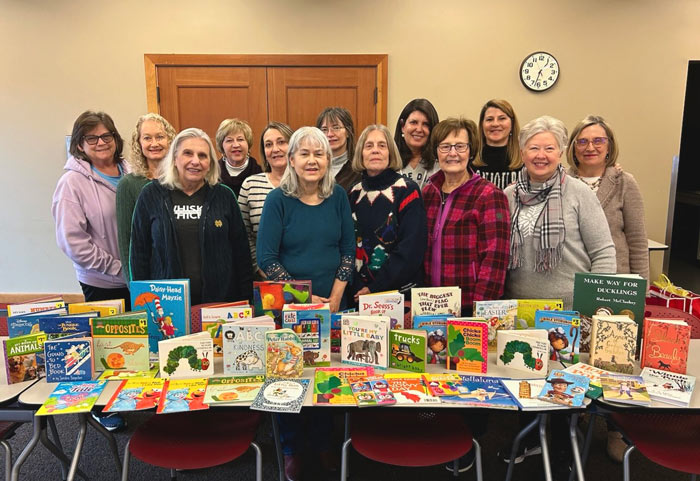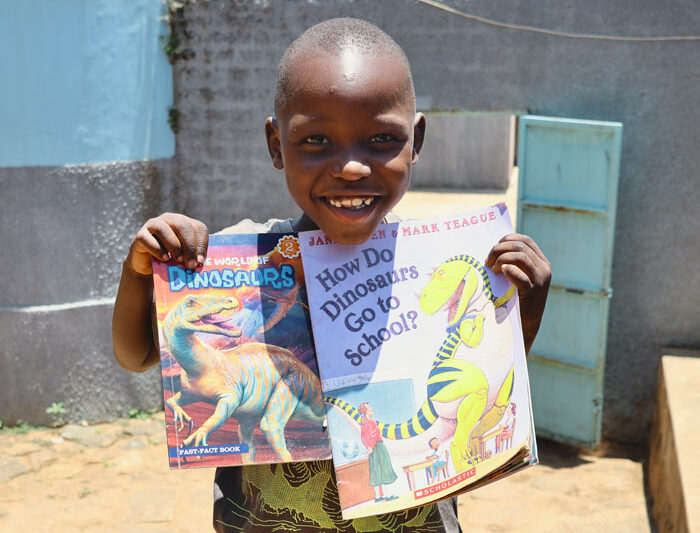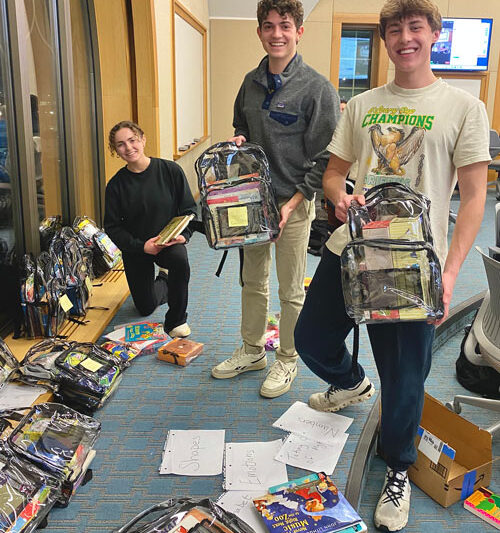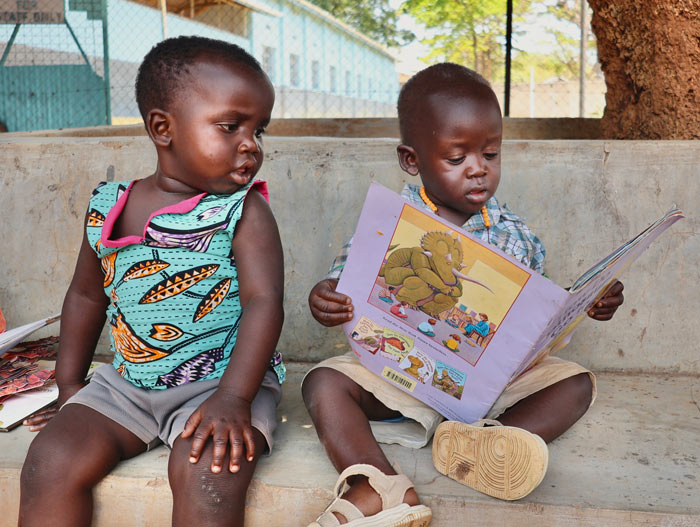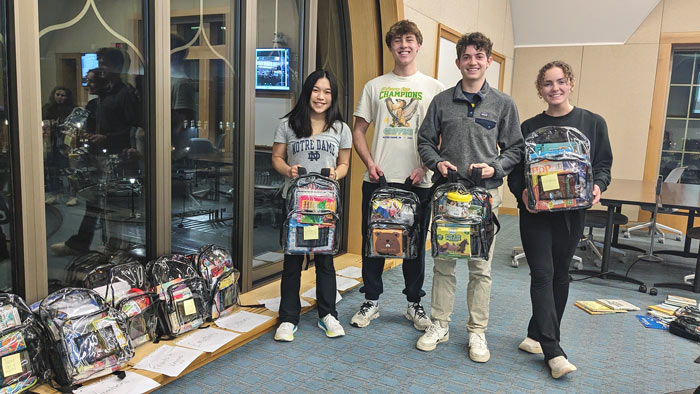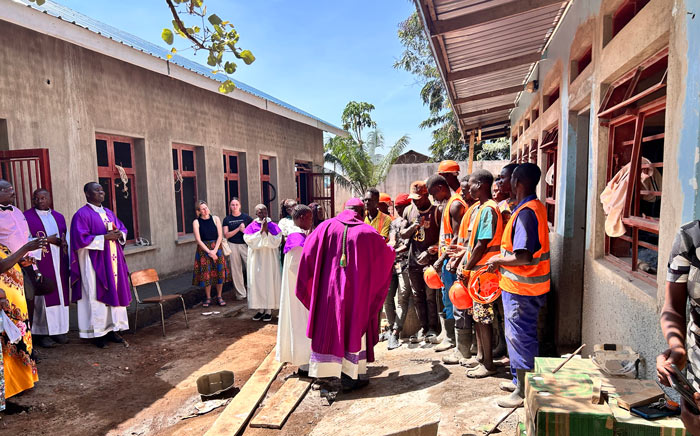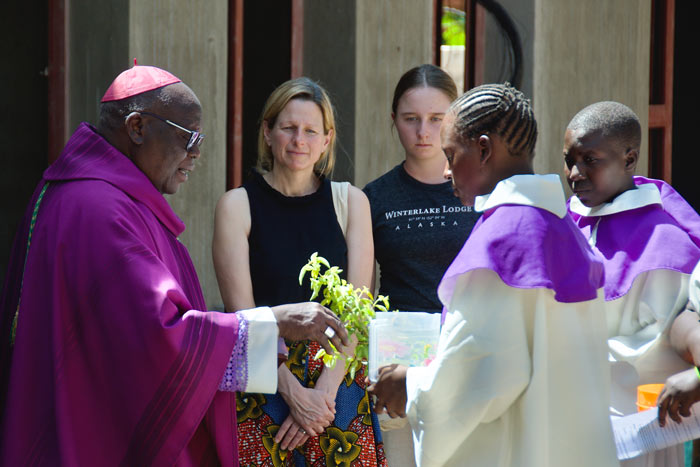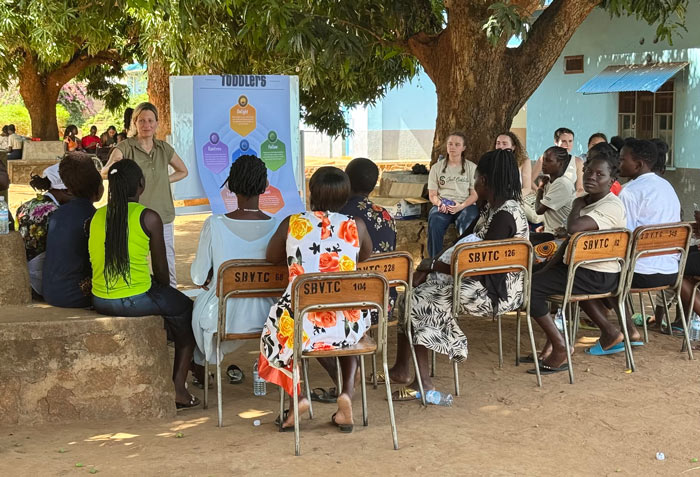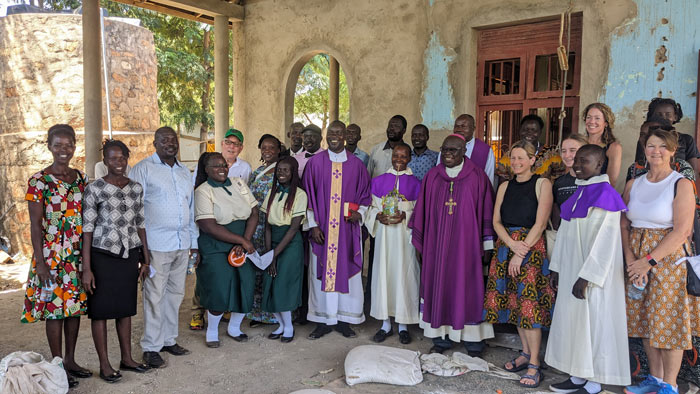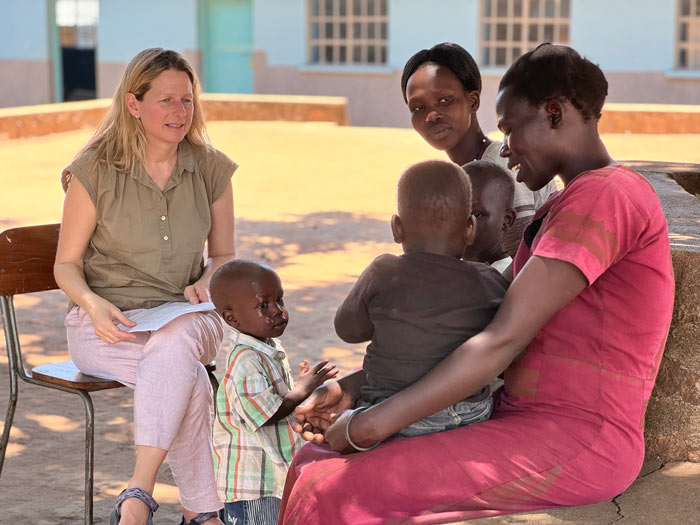First Educational Steps
Mendoza’s Powerful Means Program co-designs and opens an Early Childhood Development Center at St. Bakhita’s Vocational Training Center in Uganda
Published: April 5, 2024 / Author: Danna Lorch
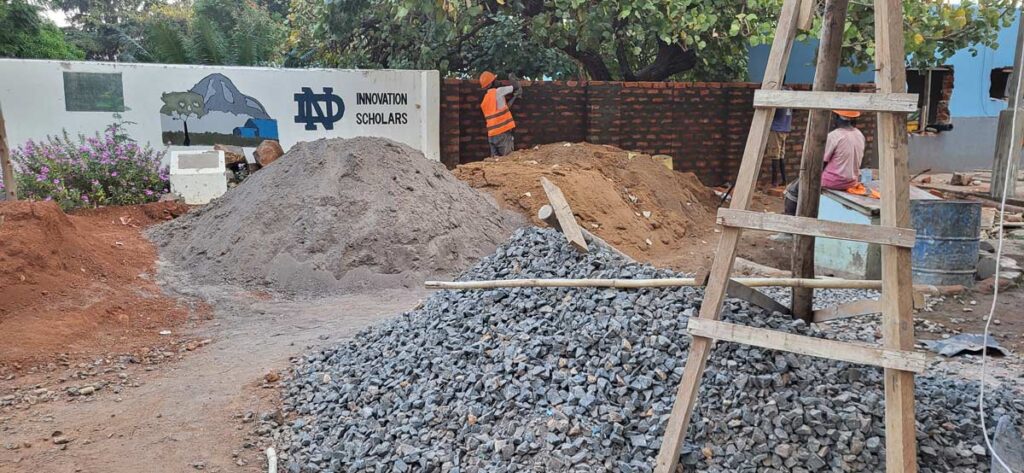
Wendy Angst has been known simply as “Mama Wendy” by the scholars at St. Bakhita’s Vocational Training Center since she took her first trip to northern Uganda’s Agago district in 2020.
Angst, a teaching professor at the University of Notre Dame’s Mendoza College of Business, is the director of the Powerful Means Initiative (PMI), an immersive experiential learning program for Mendoza undergraduates committed to tackling the world’s most challenging problems through the application of business and design thinking methods. PMI’s first collaboration is with St. Bakhita’s, a women’s vocational school striving to empower its students — the Innovation Scholars — and improve the economic prosperity of the entire region.
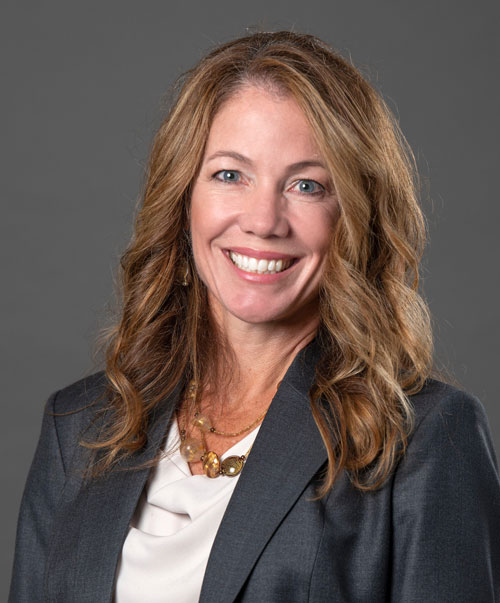
Wendy Angst
To explain the significance of PMI, Angst quotes an African proverb:
“If you educate a man, you educate an individual. But if you educate a woman, you educate a nation.”
This collaboration between PMI, St. Bakhita’s and the Archdiocese of Gulu is doing just that. In October 2023, the Center graduated its first two cohorts of Innovation Scholars, students receiving tuition support in the form of a work-study model, totalling 156 young women.
Innovation Scholars spend a year learning a vocational skill, such as catering, computers, hairdressing or tailoring. They also immerse themselves in a business-centric curriculum, with additional support from Notre Dame students in entrepreneurship, financial management and English. Scholars deepen their understanding of agriculture and agroforestry at the school’s farm, aptly named Innovation Acres.
The goal for the Innovation Scholars is to graduate ready to start a business that provides an innovative way to address a pressing problem in the Scholar’s community. Some will stay on for a second year as Innovation Fellows to continue to receive mentorship and funding support through the Powerful Means Accelerator, a student-run fund that invests in impact projects.
Many of them are already mothers and lack a safe and educational daycare solution. In St. Bakhita’s classrooms and computer lab, Angst observed scholars learning while holding babies in their arms or knotted to their backs with colorful blankets.
A mother of three herself, Angst dreamed of establishing a safe space to learn, explore and grow for children under 4 years of age who are too young to attend public school. For many of their families, the cost of attending school at all may be out of reach.
Angst’s dream is now becoming a reality.
St. Bakhita’s will be opening the doors of its newest addition, the Early Childhood Development Center (ECDC), at the beginning of May 2024 with the support of a generous gift made to support St. Bakhita’s through the Powerful Means Initiative at Notre Dame.
In a region where most families struggle to get by on $1 a day, girls are often married off to secure a dowry to make financial ends meet. Others get pregnant outside of marriage. “Most young women who have children in Uganda are forgotten,” Angst explained. “There is no structure in place for them to go back to school. Having an intentional space for them to educate themselves and their little ones and gain the skills needed to support their families is what I envision for the ECDC.”
“At Notre Dame, we have the honor of being a great university that cares deeply about making an impact through research and service, enabling our students to serve as a powerful means for good,” she added. “This commitment from the University has enabled us to extend our classroom to Uganda as we collaborate with and support these hardworking, smart and capable people.”
With the opening of the ECDC, two more classrooms now can help the women’s children take their first educational steps.
Education is Everything
The ECDC and St. Bakhita’s are thriving under the leadership of Victoria Nyanjura (ND ‘20), a graduate of Notre Dame’s Master of Global Affairs’ International Peace Studies Program.
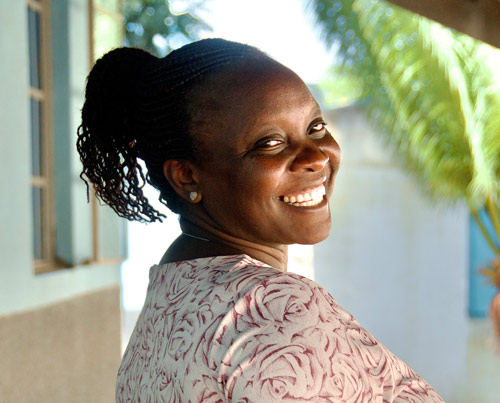
Victoria Nyanjura
Speaking via Zoom from the solar-powered computer lab at St. Bakhita’s, Nyanjura said, “I’m certain that our ECDC will influence people in the community who didn’t previously see the value in taking children to school early on and will lead them to continue to keep them in the school system, first in elementary education and then later on at St. Bakhita’s.”
In a community once devastated by war, having access to education and the dignity that comes with employment is everything. In the early 2000s, the brutal Lord’s Resistance Army (LRA) kidnapped more than 30,000 of the region’s children. One of them was Nyanjura.
Angst explained that the LRA forced the girls into marriages with its soldiers. At the same time, the boys were conscripted as child soldiers, carrying out horrific crimes against their communities. “We can’t even begin to understand the emotional trauma existing in this community. The war touched everyone — whether directly or now as it’s passed down through generational trauma.”
The societal impacts run deep, resulting in stunted economic development and some of the highest rates of poverty in the world.
The Agago District community installed a large cross on Mt. Oret, the tallest rock on the edge of Kalongo in the Agago District, illuminating it at night to guide home those who could escape. Many of the girls escaped with babies — and some of those daughters, now in their teens, are young mothers themselves.
Founded in 2007, St. Bakhita’s Vocational Training Center supports these young women, taking its name from St. Josephine Bakhita, the patron saint of victims of modern-day sex trafficking and slavery.
The Building and Co-designing of the ECDC
The early childhood development center (ECDC) project was enriched by its collaborative nature as students, faculty, alums and donors have been involved at every stage of the project’s development — walking hand in hand with St. Bakhita’s leadership and community to co-design the space, its curriculum and business model.
The sunlit, playful childcare center was co-designed by Notre Dame School of Architecture students and faculty, and local stakeholders, while the self-sustaining business model was co-designed by Mendoza students with the Center’s leadership.
Associate Professor of Architecture John Onyango requires his studio students to study non-Western architecture, looking beyond eurocentric design to understand how other cultures impact the discipline.
One of Onyango’s students, Matthew Espeland (ND ’24), had planned to spend the semester working on a cultural center in Turkey. But when Onyango brought Angst into the studio as a guest lecturer, Espeland permanently changed directions.
Angst initially challenged the studio to draft a concept for the ECDC. However, after reviewing the plans, she surprised them with an invitation for four students to join a fully funded PMI trip to Uganda in March 2023 to develop the concept with stakeholders on the ground. Espeland and three architecture classmates — Nathan Walz, Elizabeth Reay and Caroline Larocca — jumped at the chance, accompanied by architecture graduate Carlos Flores (ND ‘23) who had traveled with Angst previously as a part of his minor in Innovation and Entrepreneurship.
“We had a lot of confidence at that stage that if the design worked for us, it would work for St. Bakhita’s,” Espeland said, shaking his head. “The four of us packaged up the presentation we had given to Professor Angst and got on the plane to Uganda, thinking we would mainly be showing our design and completing our measuring and site documentation process.”
When the van bringing the group to St. Bakhita’s turned down a dirt road onto the school’s three-acre complex, Espeland realized with a sinking feeling that they would have to start over — this time with more input from the stakeholders.
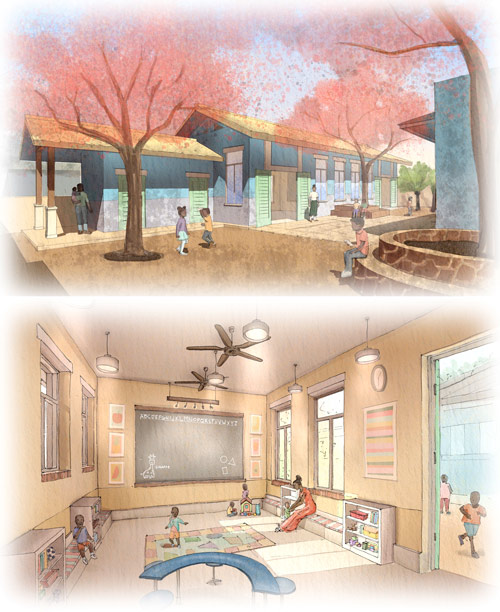
Illustrations of what the childcare center will look like.
Over the next week, they sat down with Nyanjura and the St. Bakhita’s board, students who are mothers, local community members and priests. “We asked them to describe the ECDC they envisioned, and we drew it on paper as we spoke,” Espeland said. “The process was a collaborative co-design.”
They also toured different structures in the area to understand how buildings are constructed using locally sourced materials such as handmade adobe brick with traditional thatch roofing, which helps structures stay cool and dry during the annual rainy season.
Espeland said, “We left Uganda with a single crumpled sheet of tracing paper containing our new design concept incorporating everyone’s input. We knew the design was ready to go this time.”
The ECDC is being constructed with locally sourced, sustainable materials that can quickly and affordably be maintained or repaired without waiting for an expensive overseas shipment.
“The walls begin with wooden columns, which are then wrapped in vines, with soil inside and locally fired adobe bricks layered on either side,” said Onyango. “For the roofing material, we used iron sheets with thatch on top. The iron keeps the rain out, and the thatch controls the temperature and stops the noise of the rain hitting metal.”
Now a fifth-year student, Espeland has taken an additional trip to Uganda to conduct research for his thesis, which involves designing a trade school in the region to teach local building practices. He hopes that the school would generate more jobs to keep traditional crafts alive.
To date, more than 500 Notre Dame students have participated in Angst’s Innovation & Design Courses, which uses experiential learning techniques to engage Mendoza students in helping St. Bakhita’s to become economically self-sufficient by 2027.
The courses are so popular that Angst created a minor in Impact Consulting and also supports an on-campus club, Innovation 4 Impact. The club attracts about 70 students to each meeting and is currently engaged in organizing and funding the purchase of supplies, books and educational materials to stock the ECDC.
The club already has generated enough donations to create 11 curricular-themed backpacks with books, activities and other supplies. As an example of the support extended by the entire Notre Dame family, the Ladies of Notre Dame, St. Mary’s College and Holy Cross College organized a book donation and collected 200 children’s books for the ECDC.
The Gift of Generosity
In November 2023, in her Manhattan apartment, Carrie Quinn (ND ’96) unrolled the group’s full renderings for the ECDC. Thanks to a generous gift from Quinn and her husband, James Parsons (BBA ’96), St. Bakhita’s had just broken ground to begin constructing the ECDC. Quinn and Parsons are co-chairing Notre Dame’s For Good Initiative, the school’s current capital campaign.
They first met Angst at a Notre Dame event in fall 2022 where Nyanjura and a group of Innovation Scholars brought down the house, sharing their educational journeys and the need for an educational space for their children.
Quinn, a pediatrician who serves as executive director of the Mount Sinai Parenting Center where she trains health-care providers and creates resources to promote early childhood development could immediately understand the urgent need for the Center.
Quinn said, “The science is clear that a nurturing environment is important for a child’s early development — interactions with caregivers, stimulation, feeling safe and secure — are essential to help children build skills and stimulate early brain development.”
As Onyango guided the students in designing the ECDC, they took these goals to heart. “The initial idea was just to design a daycare, but over time, the relationship between the daycare center, the importance of early childhood development and entrepreneurship began to steer the design,” he said.
The open-plan classrooms for young children offer group areas, a few soft steps to aid in developing both fine and gross motor skills, bathrooms with changing areas and smaller exploration spaces for napping or imaginative play.
The ECDC is adjacent to the mothers’ classrooms, enabling students to quickly step out to breastfeed, share a meal or play with their children under the shaded trees in the courtyard.
Nyanjura said that of the 40 ECDC children, 25 spots will be dedicated to families who live in the surrounding area and can pay tuition. This will offset the costs of providing 15 St. Bakhita’s scholars with free childcare. She is currently hiring experienced staff to be trained as the curriculum is co-created.
With additional funding, Angst envisions the ECDC becoming a place for Notre Dame students to come and spend their summers studying abroad in Kalongo and working at the ECDC. Longer term, she sees the ECDC being able to give many more young women the chance to stay on at St. Bakhita’s for a second year as Innovation Fellows knowing that their childcare needs will be provided, and as an additional curricular offering for the Innovation Scholars at the vocational center.
Just recently over spring break 2024, Quinn and her 16-year-old daughter joined Angst and her students on a visit to St. Bakhitas to conduct research and to participate in the blessing of the ECDC by the Rev. John Baptist Odama, the archbishop of Gulu. Quinn and her daughter supported Ciara Fay (ND ‘24) and Alex Potts (ND ‘23) in conducting initial baseline assessments of cognitive and physical development in children around the community, and Quinn directly offered parenting education, both of which will help guide the ECDC’s curriculum and set the groundwork for data-informed education.
“I felt very fortunate to spend time in this community, visiting schools, interacting with the young mothers and their children, and visiting the hospital, learning about their culture, their faith, and how they live and raise their children,” said Quinn after the trip. “I found it remarkable how universal the aspects of child development are.”
“Jim and I believe that an essential component in breaking the cycle of poverty is through the education of the next generation, starting in the earliest years,” she added. “We are so grateful to be able to support Professor Angst, the Notre Dame students and the Saint Bakhita’s community in strengthening the foundation of early childhood development.”
The ECDC will be open soon with the first cohort of PMI Research Fellows scheduled to be onsite in June 2024 to conduct further assessments and to support the staff in curriculum development.
“Getting to this point with this impactful work is made possible because of the passion and commitment of the Notre Dame family, across colleges and across classes of current and former students,” said Angst, “to make a meaningful difference in the lives of others, to serve as a powerful means, and amplify Notre Dame’s mission to be a force for good.”
Related Stories

